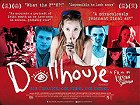Inhalte(1)
Fünf Jugendliche brechen in ein Haus ein, dessen Besitzer nicht da sind. In der sauberen, stilvoll und modern eingerichteten Umgebung wirken sie wie Fremdkörper. Ihre Zerstörungswut scheint unermesslich und brennt sich wie eine Feuerspur durch die ausladenden, mit teuren Möbeln und geschmackvoller Dekoration ausgestatteten Räume. Nach stundenlanger konsequenter Verwüstung, der Karikatur eines Familienlebens, steht der Nachbarsjunge vor der Tür. Mit ihm scheinen sich die Dynamiken innerhalb der Gruppe stärker zu verändern, neben ungebremster Aggressivität, leisen Momenten und totalem Chaos kommen langsam Geheimnisse ans Licht: Da ist Denise, die zwischen den Drogen immer wieder ihr Asthmaspray benutzen muss, da sind die Jungen Darren, Eanna und Shane mit ihrer unterschiedlich ausgeprägten Kampfeslust, und da ist Jeannie, die beim Betreten des Hauses ihre Schuhe auszog. Und die das größte Geheimnis in sich trägt ... (Berlinale)
(mehr)Kritiken (1)
As a film of indeterminate genre, Dollhouse appears on the surface to be a criticism of the empty lives of today’s young people, who outwardly do not acknowledge having any values. What lies beneath that veneer, however, is an almost Haneke-esque sadistic game played with viewer expectations. The initial situation, where a group of idiots break into a luxury villa, and the way the “innocent” scenes are interspersed with hints of something very unpleasant (close-ups of a drill, a hammer, bruises on a back), lead us to see Dollhouse as a teen horror movie in which there will be a lot of dying (and rightly so). The dialogue, through which the characters seemingly comment on the rules of films like this, necessitates the search for an alternative, less predictable key. I believe, however, that the chosen solution negates all of the assumptions that any given erudite viewer will make while watching. It isn’t shocking for the sake of being shocking. The drastic change in the direction that the film takes (or doesn’t take) enables the director to end the film with a much more imaginative point than that found in a traditional horror movie: at the end, everyone – with the possible exception of the final girl – dies. In the climax, the plot is basically turned upside down, which corresponds to the heroine’s mental state and her and her peers’ disjointed perception of reality. Like Haneke’s psychological studies of contemporary society, Dollhouse is rather exhausting for viewers. However, it will require even more effort to stop thinking about it than it did to watch it. 75%
()
Galerie (6)
Photo © Home Box Office (HBO)

